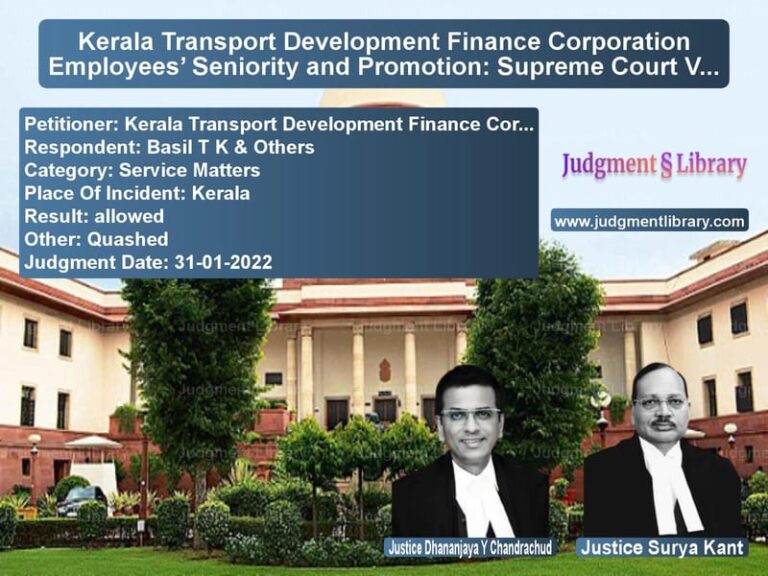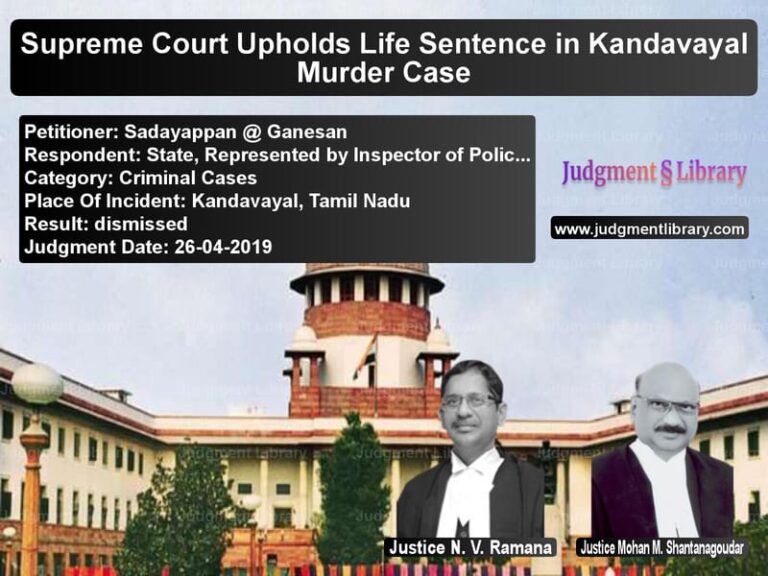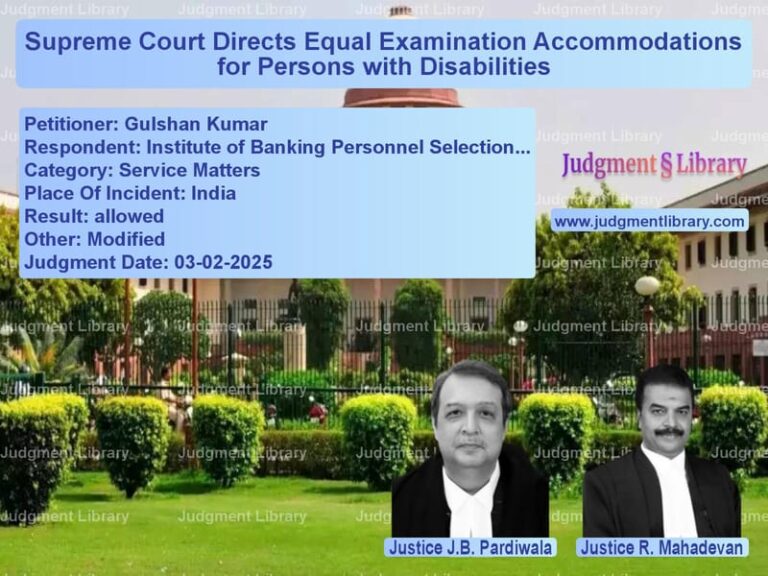Supreme Court Rejects Late-Stage Amendment of Partition Suit: A Landmark Judgment on Procedural Discipline
The case of Vijay Hathising Shah & Anr. vs. Gitaben Parshottamdas Mukhi & Ors. is a significant Supreme Court judgment that addresses the issue of amendments in civil suits. The dispute pertains to a partition suit in which the plaintiff sought to amend the plaint at a late stage of trial. The case provides critical insights into procedural discipline and judicial efficiency, reaffirming that amendments cannot be allowed to delay proceedings unnecessarily.
Through this ruling, the Supreme Court has reinforced that amendments to pleadings must be filed within a reasonable timeframe and should not disrupt the trial process. The judgment clarifies the application of procedural law under the Civil Procedure Code (CPC) and strengthens the principles that govern amendment requests in ongoing litigation.
Background of the Case
The dispute arose in Civil Suit No. 6170 of 1990, which was filed in the City Civil Court, Ahmedabad. The plaintiff, Gitaben Parshottamdas Mukhi, filed a suit seeking partition and consequential reliefs against the defendants. The case had been progressing for several years when, at an advanced stage of the trial, the plaintiff sought to amend the plaint.
The defendants, including Vijay Hathising Shah, objected to the amendment, arguing that it was filed too late and would unduly delay the proceedings. The Trial Court, upon reviewing the application, rejected the request on February 23, 2007. However, the plaintiff challenged this order before the Gujarat High Court, which allowed the amendment and overturned the Trial Court’s ruling. Dissatisfied with this decision, the defendants approached the Supreme Court.
Key Legal Issues
The primary legal question before the Supreme Court was:
- Whether the High Court was justified in allowing an amendment to the plaint at a late stage of the trial.
- Whether the amendment was necessary for determining the case fairly.
- Whether the Trial Court was correct in rejecting the amendment application.
Arguments Before the Supreme Court
Appellants’ (Defendants’) Arguments
- The amendment was sought at an extremely belated stage, when the trial had reached its final arguments.
- Allowing the amendment at this stage would significantly delay the trial and cause prejudice to the defendants.
- The plaintiff had several opportunities to introduce the amendment earlier but failed to do so.
- The suit could be fairly decided based on the existing pleadings without the proposed amendment.
- The High Court had overstepped its jurisdiction by interfering with a well-reasoned Trial Court order.
Respondent’s (Plaintiff’s) Arguments
- The amendment was necessary to ensure a comprehensive resolution of the dispute.
- It did not fundamentally alter the nature of the case but only clarified certain aspects.
- The Trial Court had taken a narrow view by rejecting the amendment.
- The procedural rules should be interpreted liberally to allow necessary amendments in the interest of justice.
Supreme Court’s Observations
The Supreme Court carefully examined the facts and legal arguments before delivering its judgment. The key observations made by the Court were:
1. Delay in Seeking Amendment
The Court found that the plaintiff had ample opportunity to seek the amendment earlier in the trial. Filing the amendment application at the final stage indicated a lack of diligence. The Court emphasized:
“An amendment must be sought at the earliest possible stage. A litigant cannot wait until the trial is near completion and then attempt to introduce new elements into the case.”
2. Unnecessary for Case Adjudication
The Supreme Court ruled that the amendment was not essential for deciding the case. The existing pleadings were sufficient to address the core dispute, and allowing the amendment would not change the substantive outcome.
3. Judicial Discipline and Efficiency
The Court underscored the importance of procedural discipline and judicial efficiency. It observed that allowing amendments at advanced trial stages would set a wrong precedent, encouraging litigants to delay proceedings deliberately.
Final Judgment
The Supreme Court ruled:
- The High Court’s order allowing the amendment was set aside.
- The Trial Court’s decision to reject the amendment was restored.
- The City Civil Court, Ahmedabad, was directed to decide the case within one month from the date of judgment.
Legal Implications
This judgment has several important legal implications:
- Timeframe for Amendments: Courts will not permit amendments that are filed at a belated stage without strong justification.
- Preventing Delay Tactics: The ruling discourages litigants from using procedural amendments to delay case proceedings.
- Reaffirmation of Trial Court’s Authority: High Courts should not interfere with well-reasoned Trial Court orders unless a clear error is established.
Conclusion
The Supreme Court’s ruling in Vijay Hathising Shah & Anr. vs. Gitaben Parshottamdas Mukhi & Ors. is a landmark decision that reinforces procedural discipline in civil litigation. It ensures that amendments to pleadings are not misused as tools for delaying justice. The judgment upholds the principle that while procedural rules should be interpreted liberally, they should not be exploited to disrupt the timely conclusion of trials.
By setting aside the High Court’s order and restoring the Trial Court’s decision, the Supreme Court has sent a clear message that procedural integrity must be maintained at all costs. This ruling serves as a guiding precedent for courts handling amendment applications in ongoing litigation.
Petitioner Name: Vijay Hathising Shah & Anr..Respondent Name: Gitaben Parshottamdas Mukhi & Ors..Judgment By: Justice Abhay Manohar Sapre, Justice Dinesh Maheshwari.Place Of Incident: Ahmedabad.Judgment Date: 24-02-2019.
Don’t miss out on the full details! Download the complete judgment in PDF format below and gain valuable insights instantly!
Download Judgment: Vijay Hathising Shah vs Gitaben Parshottamda Supreme Court of India Judgment Dated 24-02-2019.pdf
Direct Downlaod Judgment: Direct downlaod this Judgment
See all petitions in Property Disputes
See all petitions in Specific Performance
See all petitions in Judgment by Abhay Manohar Sapre
See all petitions in Judgment by Dinesh Maheshwari
See all petitions in allowed
See all petitions in Quashed
See all petitions in supreme court of India judgments February 2019
See all petitions in 2019 judgments
See all posts in Civil Cases Category
See all allowed petitions in Civil Cases Category
See all Dismissed petitions in Civil Cases Category
See all partially allowed petitions in Civil Cases Category







